The Fairy Tale Phenomenon
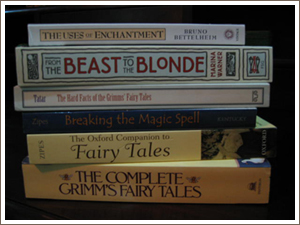 Recently I received notice about a Publisher’s Weekly Book News article entitled “Fairy Tales Gone Bad: An Excerpt from ‘Lies, Knives, and Girls in Red Dresses.’ ” Apparently in this book by Ron Koertge and Andrea Dezso, the central figures in many popular fairy tales do unspeakable and surprising things. Coupled with the remarks about fairy tales our Friday guest, Dean Hardy, made, this article has me thinking about the progression of fairy tales.
Recently I received notice about a Publisher’s Weekly Book News article entitled “Fairy Tales Gone Bad: An Excerpt from ‘Lies, Knives, and Girls in Red Dresses.’ ” Apparently in this book by Ron Koertge and Andrea Dezso, the central figures in many popular fairy tales do unspeakable and surprising things. Coupled with the remarks about fairy tales our Friday guest, Dean Hardy, made, this article has me thinking about the progression of fairy tales.
Perhaps the most famous fairy tales, intended for an audience of adults and children alike, come from a collection by Jakob and Wilhelm Grimm, with Hans Christian Andersen’s, a close second. Both the German writers and their Dane counterpart published in the early 19th century. By the middle of the 20th century in America, fairy tale translations were commonly aimed at children, with some endings softened to remove images that might disturb young minds.
And there was plenty of material in those stories to disturb–child abuse, brutal deaths, prejudice, and the presence of evil in the world. The softened versions, perhaps epitomized by the Disney films and accompanying comic books, seemed to anchor fairy tales in the camp of stories for children.
I first realized that fairy tales were making a comeback for an older audience when I learned about Shannon Hale’s reinvention of a fairy tale in her debut novel The Goose Girl. Since then, I’ve found that writers like Robin McKinley (Rose Daughter, Beauty: A Retelling of the Story of Beauty and the Beast) and Donna Jo Napoli (Spinners, The Magic Circle, Zel, Crazy Jack) preceded her with fairy tale novelizations.
As so often happens, books, film, and TV mirror each other. When a genre becomes popular in one venue, it’s just a matter of time before it becomes popular in another. Fairy tales have had moderate success in movies since Princess Bride and Ever After. Now TV has discovered them as well, most notably in Grimm (NBC) and Once Upon A Time (ABC). Unlike the softened, for-children stories of thirty years ago, these shows have a decided, 21st century dark edge. Some might even say they lean toward horror.
Happily, Christians have joined the fairy tale retelling and/or invention. Melanie Dickerson (The Healer’s Apprentice, The Merchant’s Daughter) Anne Elisabeth Stengl (Tales of Goldstone Wood series), Suzanne Lakin (The Gates of Heaven series) are some of the authors writing novels either inspired by fairy tales or re-configuring them.
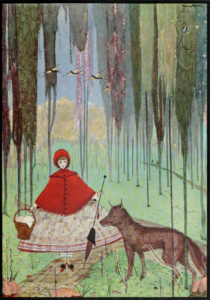 So I wonder. Is our perception of fairy tales changing? As Dean said in his post Friday, some guys feel as if their “man card” is at risk if they admit to reading fairy tales. Tolkien has wars and a civilization-saving quest, outsmarting a dragon and evading goblins, but fairy tales are about saving a damsel in distress. The damsels, of course, very much want those stories told. But do guys want to read them?
So I wonder. Is our perception of fairy tales changing? As Dean said in his post Friday, some guys feel as if their “man card” is at risk if they admit to reading fairy tales. Tolkien has wars and a civilization-saving quest, outsmarting a dragon and evading goblins, but fairy tales are about saving a damsel in distress. The damsels, of course, very much want those stories told. But do guys want to read them?
Have the “gender wars” made fairy tales unpalatable to men? The retelling, I notice, often makes the damsel the hero of her own story–though less so in those by Christians.
So many thoughts and questions. What effect do “no-rescue” stories–those in which the main character finds his or her own way out–have on our culture?
I’d love to hear your thoughts on fairy tales. Feel free to weigh in on any of these questions or pose your own. Have you read any of the more recent fairy tale retellings or any of the stories fashioned in the style of fairy tales? Is this a genre you want to see more of?
I’m looking forward to your thoughts.


































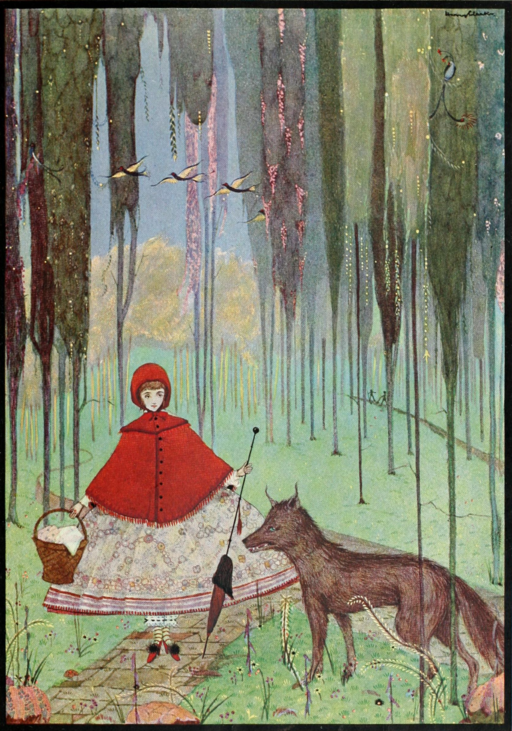

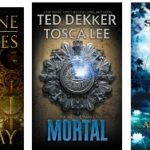


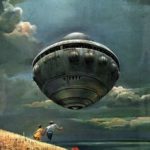



I call it – the darknening of America. It isn’t just fairy tales, which used to be able to tell to my children and now grandchildren with ne fear of poor endings or bad characters. Now darkness is finding yet another way to subvert our culture into believing that all things bad is good and all things good are bad. But what of good Christian literature as an answer? Where is it to stand in the gap and offer good that is good and bring to light the bad that is bad? Terry Fictionbypalmer
I’m probably not qualified to respond on this, since I’m a girl and I like fairytales. I know they’re not my husband’s preferred reading, although he does watch Grimm with me. (All the more so since season 2 has started off, and there’s so much more plot.) He prefers male heroes (Doctor Who) who swashbuckle with much snark (Princess Bride, Pirates of the Caribbean, the Monkey Island adventure game series). There has to be high adventure (pick a superhero movie) and lots of action (pick a superhero movie).
(Come to think of it, that describes the book I’m writing, since it’s more or less his story with my spin on it.)
Fairytales tend more toward romance with horror. The cannibal witch, the princess rescued by the prince, who breaks her spell, the girl and her grandma being eaten alive by a wolf. Russian fairytales have an almost heavy-metal feel to them (like the one about the girl who kills her evil stepmother and stepsisters with a cursed, flaming skull.)
If you like that kind of thing, you’ll eat it up, whether you’re a guy or a girl. My brother’s reading habits tend toward dystopian and post-apoc, while my dad loves science fiction (the hard stuff), and high fantasy like Lord of the Rings.
I read a blogpost somewhere about this guy talking about when he was young, he liked hot-blooded high action/adventure. As he aged, he wanted thrillers about middle-aged men with families in peril. Now that he’s older, he likes thrillers like Grisham and political thrillers, things with older protagonists dealing with grandkids among the action. (Badly paraphrased, apologies to the original article’s author.)
Each age demographic likes and reads something different. Girls like princesses. Some other article I can’t find talked about how even though damsels in distress are frowned upon by our enlightened culture, Disney got it right. Little girls don’t want tough women with swords. They want Belle and Aurora and Snow White.
I tend to stay locked away in my writer’s garret ( 🙂 ) so I haven’t observed fairy-tale trends. But I for one love stories where men rescue women! Not, however, the stand-on-the-sidelines-helpless-screaming sort of women. Those are–ahem–irritating.
I like men-rescue-women stories for several reasons. It’s refreshing (and comforting!) to see a man behave like man and risk his life for the weaker sex. And it’s exciting to read/watch. 🙂 But it also speaks to two truths, one being that women are weaker than men and simply can’t perform the same physical feasts; however, I have nothing against a woman using common sense and learning to defend herself. The second truth is that being rescued is an aspect of being protected and loved, and I think it’s in a woman’s nature to want that.
Now I’m interested in the fairy-tale authors you mentioned. Going to check them out…
These are insightful thoughts and questions. Thank you for posting!
Blessings,
Literaturelady
I think men like the darker fairy tales. My son does, anyway. My daughter likes the dark and the light.
I have always love fairy tales and I don’t mind if they are dark or light, as long as they end with hope. I hate stories that end with no hope.
Most men I know loved the Shrek movies, which were certainly a fairy tales, even if they were spoofs on fairy tales, and The Tenth Kingdom was one of my son’s favorite movies.
I would love to see more fairy tales or all sorts. I liked Levine’s Ella Enchanted and Edith Pattou’s East was one of my favorites. I like modern retellings, too, like…I can’t think of any off the top of my head.
Oh, yeah, Ever After was good too.
I have always enjoyed fairy tales. As a child, I gobbled them up wherever I could find them, along with mythologies from around the world. Then I moved into science fiction and fantasy. But fairy tales were always there inside me, a foundation of parables each with their own message. “Things are not always as they appear.” “Nothing good is ever free.” “An unkind act will always end in grief.” “Curiosity leads inevitably to grief; some things are better off not known.” The messages were not always biblical, but they were effectively illustrated in the fantastical story.
I think the classic fairy tales were mostly pretty dark. The re-tellings today may sometimes be dark, but hardly moreso than some of the originals. I’m no sociological expert, but it seems there’s an overall trend in the direction of the supernatural these days. A resurgence of ghost tales, other paranormal themes, psychics and fake psychics, vampires and werewolves, witches and wizards and super heroes and mutants with powers much the same as the fairy tales.
Seems to me like it’s a pendulum swing in reaction to the over-scientification of things. I know, scientification is not a word. But you know what I mean. The civilized world has been strongly focused on the explosion of scientific knowledge and technological advances for over 100 years. I think we have reached a pinnacle of sorts, where people are talking about crafting humans by adjusting genes — and it’s no longer in the realm of fairy tales. It appears within reach. This is a frightening place for people with no solid anchor of faith (and perhaps even for the believer). It pushes us to some serious questions, and storytellers are always expressing the deep questions of their generations to the world.
What does it mean to be human? What is the purpose of a human life? What does it mean to be a monster? What is the proper response to monsters in your life? What if the monsters and the people look the same on the surface? What if we look different, but are the same inside? Are there Greater Beings pulling the strings somewhere, and what is their nature and intent?
Seems to me that could be part of the popularity of fairy tale stories these days. That, and the fact that the entertainment industry seems to find it safer to re-tell the story successes of the past than to try and do something “new”.
Great thoughts, Teddi. I agree that the classic fairytales were gruesome–which is why the 20th century publishers thought to create the more pampered environment for children. I skimmed “The Goose Girl” for instance, and when the king discovers the rightful princess, he turns to the imposter bride and asks her what kind of punishment someone unfaithful to her mistress should receive. She said she should be put in a barrel or something with shards of glass and dragged behind a horse until dead. Done, the king said, and meted out that punishment. So the prince, with his imposter bride dead, was free to marry the true princess.
Happy ending? 😕
I also agree that the current fascination with the supernatural is our culture working out this fairly new realization that science hasn’t told us everything there is. And as I understand it, looking at monsters, as you so well described it, is part of that process.
But then you bring up one of my pet peeves with the film industry–no original stories. I don’t mind great books being turned into movies. There are even some I wish they’d take on. But when we start having remakes of remakes . . . well, I think they might be trying too hard to stay with the sure thing.
Becky
Totally agree about Hollywood, Becky! That’s part of why I’m excited to see technology making it easier for independent authors and film makers to get their stories out there. It’s hard to sort through all the garbage to find the good stuff, but there is some good stuff starting to appear.
I prefer the darker fairy tales. There. I admit. I’ve done a fairy tale retelling in a darker style than than the Disney version. It was Rapunzel, and had nothing to do with Tangled. Granted, I changed the POV and setting to make it a darker vigilante story.
I prefer darker stories not because they’re darker, but because they’re more realistic. (Unless it gets taken to far.) The original fairy tales were very dark. (Like the cursed flaming skull one. Or the prince in Rapunzel getting thrown out of the tower by the with and being blinded by thorns.)
“So many thoughts and questions. What effect do “no-rescue” stories–those in which the main character finds his or her own way out–have on our culture?”
I suspect they play a part in the thought-school of being able to pull ourselves up by our boot straps, that we can do anything, and that we don’t need help.
I love Stengl’s books, I really do. And as for no-rescue stories…I kind of like the ones with mutual rescues. Like how in Doctor Who, River saves the Doctor in Forest of the Dead and Let’s Kill Hitler, but she can only do that because he’s saved her from the Tessalecta.
Really enjoying your Doctor Who examples, Galadriel! It helps me put my finger on some of the things I love about that series.